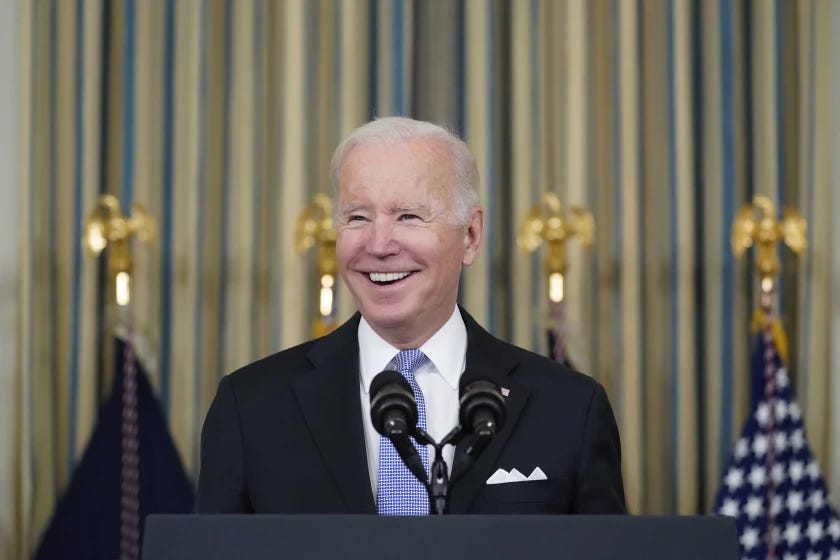Will Biden’s upcoming infrastructure roadshow sink enthusiasm for Build Back Better?
Some progressive leaders are worried the White House’s victory lap for the president’s latest legislative win may come at the expense of the other half of his agenda.

Now that Congress has passed the bipartisan infrastructure deal, one of President Joe Biden’s signature economic policies, the White House is sending Biden and his top Cabinet officials out on the road to unpack all the ways it could improve our lives and communities.
First up is a visit to Baltimore tomorrow to talk about how the deal upgrades the nation’s ports and reinforces its supply chains to prevent disruptions. In addition to national and regional media, the White House said senior officials will also target Black and Spanish-language outlets — two important coalitions within the Democratic tent — and digital channels with explainers, videos and other content.
This tracks with reporting in last week’s newsletter, which spoke to the high stakes Democrats feel to sell a tremendous piece of legislation to an electorate that's unsure of the specifics of it — all while competing against a conservative media ecosystem that feels as though kids are under attack … by Big Bird.
“This is a historic investment in our economy and workers, a White House official said in a statement. “And our focus will be on making sure the American people know tangibly how this bill is going to improve things for themselves, their families, and their communities.”
But some progressive leaders are worried that this strategy could put the Build Back Better Act at risk of giving voters, the press and conservative Senate Democrats the impression that passing the legislation is now an optional step to achieving President Biden’s economic agenda.
A White House official did not comment on these concerns but did reinforce the president’s optimism for and commitment to passing the Build Back Better Act.
Jennifer Epps-Addison, president and co-executive director of the Center for Popular Democracy Network, a Brooklyn-based progressive advocacy group, told me over the phone that while the bipartisan infrastructure deal includes billions of dollars of investment in infrastructure that communities need to thrive, it falls far short of the investment needed to meet the challenges we all face.
“Congress must work to deliver on the promise of President Biden’s full agenda, to begin to transform our society into one that values the health and vitality of communities over the profits of corporations,” Epps-Addison said. “After generations of divestment from Black, brown, low-income and immigrant communities, shoring up the same old broken systems just isn’t enough. We need safe, affordable housing, healthcare access, a pathway to citizenship for essential workers and immigrant youth, and an overhaul of climate change which threatens the entire planet.”
The bipartisan infrastructure deal, which passed the House late last Friday night, funds long overdue upgrades to the nation’s rails, roads and bridges while purifying America’s water systems and ensuring rural communities have access to broadband internet.
As I mentioned in Saturday morning’s special edition, the deal also represents a promise kept by President Biden, who campaigned to overcome the entrenched ideological differences in Congress if elected and show Americans that Congress can get meaningful things done. And it also gives frontline Democrats at risk of losing in next year’s midterms a concrete win they can sell to their constituents, many of whom could sit out or swing to Republican candidates in protest.
Then there’s Build Back Better, which started as a $3.5 trillion proposal crafted by Senate Budget Chair Bernie Sanders of Vermont to accommodate the bulk of President Biden’s domestic campaign promises. It was originally part of what Senate Democratic Leader Chuck Schumer called a “two-track strategy” to pass it alongside the bipartisan infrastructure deal. As I wrote in Saturday morning’s special edition, the initial plan was to link the two bills together so progressives who believe Build Back Better includes the major investments in both historically underserved communities and the environment would vote for the bipartisan infrastructure deal that conservative Democrats were eager to pass. And since the Build Back Better act includes several provisions that Republicans refuse to support, Democrats planned to use a procedure that enabled them to pass the legislation with a simple majority vote in the Senate. (Vice President Kamala Harris would break the tie.)
By the end of last month though, after weeks of negotiations, President Biden unveiled a $1.85 trillion framework that he assured could pass both the House and Senate. The framework includes universal preschool for all 3- and 4-year-olds and an income cap on child care for most families, expansions to Obamacare and Medicare to provide health care for millions of uninsured people and the cost of hearing for seniors, lower prescription drug prices, investments and public housing, funding for Pell Grants and HBCUs, and more than $550 billion for climate action. But the President’s framework excludes tuition-free community college, a dental and vision coverage for seniors and paid family leave.
The House plans to include four weeks of paid leave in the bill it sends to Senate. But the benefit is likely to be removed by Sen. Manchin, who said to CNN last week that he supports paid family leave but believes it should be negotiated with Senate Republicans not included in a reconciliation bill because it would “be forever.” A spokesperson for Sen. Manchin did not respond to Supercreator News when asked why paid family leave would attract support from Republicans, a similar argument the Senator made on voting rights — an issue that has attracted one GOP Senate vote on a bill that would restore previous protections, not extend new ones.
After the vote on the bipartisan infrastructure deal, the House also passed a rule that enables it to pass the Build Back Better Act — which includes the rest of President Biden’s economic agenda — next week when representatives return from recess. But this effectively unlinked the two pieces of legislation and widened the trust deficit that I’ve previously reported on between rank-and-file progressive and conservative Democrats. “I fear that we are missing our once-in-a-generation opportunity to invest in the American people,” Rep. Rashida Tlaib of Michigan, who believes the progressive caucus has less leverage to prevent additional cuts to Build Back Better, said in statement last Friday. Tlaib is one of six Democrats who voted against the bipartisan infrastructure deal.
The provisions in both the bipartisan infrastructure deal and Build Back Better Act are popular with voters who are aware of them. But Democrats — including Biden and Harris, two of the most prominent leaders — aren’t, according to new polling that shows the president’s approval rating at a new low of 38 percent and the vice president trending 10 points lower.
“Polls are all over the map. And that’s not going to be our focus right now,” White House principal deputy press secretary Karine Jean-Pierre said yesterday. “We are confident that our policies will improve the lives of nearly every American and grow our economy and create jobs. That’s our focus.”
During a press availability with reporters in Paris, where Vice President Harris is spending the week at the invitation of French President Emmanuel Macron to discuss a range of domestic and international issues, the vice president’s chief spokesperson Symone Sanders sounded a similar tone. “We’re focused on a lot of things,” Sanders said. “I’ll let the pundits pontificate on that — the polls are a snapshot in time.”
Maybe so. But Epps-Addison told me she’s “old enough to remember what happened in 2014 and 2010” when Democrats failed to deliver on their promises and ultimately lost the House and Senate — and the opportunity to pass any transformative legislation. And it’s clear from the young people and voters of color I’ve talked to that they see the bipartisan infrastructure deal as a part — not the sum — of the President’s agenda.
“Our economy can no longer afford the lopsided and inefficient status quo in which corporations maintain billions of dollars in subsidies and tax breaks while working families are left subject to predatory business practices and crumbling national infrastructure,” she said. “The Build Back Better Act would begin to address this imbalance.”
Supercreator Weekly is a reader-supported newsletter, anchored by a vibrant community of premium subscribers who enable the hours of reporting that goes into the unbossed, unbought and unfiltered journalism you’re reading. If you know someone interested in the intersection of national politics and pop culture and who feels creative professionals should be able to live off their work, feel free to forward this post to them. And if you’d like access to bonus updates beyond this free weekly newsletter from my weekly conversations with policymakers, business leaders, scholars and fellow creators, subscribe for the full experience.
Read All About It
Jamelle Bouie on what “systemic racism” really means. Anna Holmes on women and the liberating power of no. Nick Corasaniti, Reid L. Epstein, Taylor Johnston, Rebecca Lieberman, Eden Weingart on how maps reshape American politics. Caitlyn Collins, Leah Ruppanner and William J. Scarborough on the missing child care infrastructure that keeps moms from returning to work. Astead W. Herndon on the collision between the urgent needs of Chicago’s West Side with DC’s preference for compromise. Aliza Abarbanel on how to stop grinding your teeth. Arthur C. Brooks on what most winter-haters get wrong Chris Crowley on the coffee bean emoji. Ian Millhiser on the Supreme Court’s choice between religious liberty and the death penalty. German Lopez on why America can’t fix the police without fixing the country’s gun problem. Kimeko McCoy on how God-is Rivera helped put Black Twitter in front of marketers. Lauren Lumpkin on mold, mice and month of protests at Howard University. Eric Levitz on why liberals should speak up when keeping it “woke” goes racist. Darby Saxbe and Sofia Cardenas on what paternity leave does to a father’s brain. Michael Tomasky on Joe Biden, who actually was elected to be FDR. Jemele Hill on why Aaron Rodgers felt free to mislead people.
Michael’s Picks
Work Mate Marry Love: How Machines Shape Our Human Destiny by Debora L. Spar ($18): A thought-provoking deep dive into how artificial intelligence and robots are shaping how we find love, enjoy intimacy and shape families.
Maison Kitsuné CAFÉ KITSUNÉ Coffee Tumbler in Black ($35): This tumbler brings me nostalgia from my days as a magazine journalist when I’d feature this French-Japanese brand in as many stories as my editor would allow.
Madewell Denim Easy Long-Sleeve Popover Shirt ($98): A twist on the Levi’s denim jacket that my friends will tell you I can’t get enough of.
Thank you for reading Supercreator Weekly! Want more reading and product recommendations? In addition to this newsletter, premium subscribers also get Supercreator Select, a bonus Saturday edition of Read All About It and Michael’s Picks to inspire you during your leisure time.
Subscribers also get Supercreator Review, an exclusive and in-depth recap of the week’s interesting and essential stories in national politics and pop culture — and their impact on online creators and their fans.
Not a subscriber? Upgrade your media diet for just $5/month or $50/year. Already a premium subscriber? Then I’ll see you in your inbox on Friday morning!






